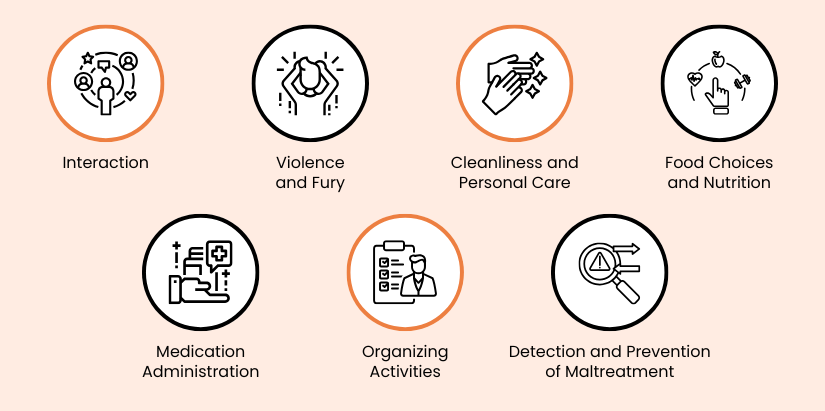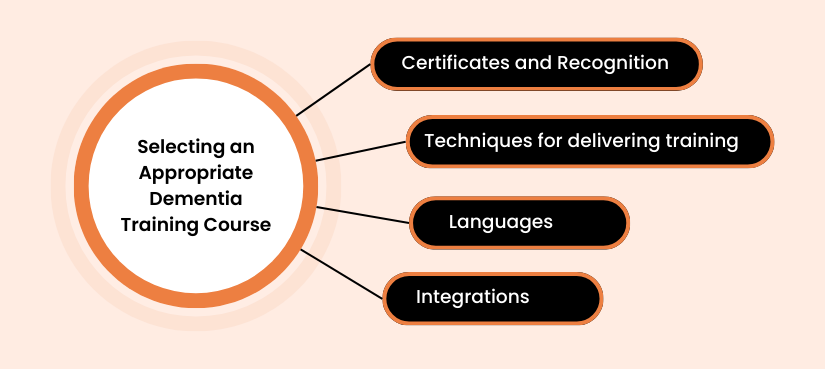
Taking care of someone with dementia is different from general caregiving — it needs particular skills, a good grasp of how cognitive decline works, and solid communication along with behavioral strategies.
Whether you’re a family member providing nonstop care or a professional caregiver aiming to meet industry standards, having dementia-specific training can lead to better patient care and boost caregiver confidence.
In this article, we’ll dive into why dementia training for caregivers is so important, the key skills to focus on, and how to choose the best dementia caregiver training program. We’ll also touch on the stages of dementia, the types of training available, and useful frameworks like the 4 R’s and the 7 A’s of care.
When you’re caring for someone with dementia, it’s not just about helping them physically — it’s about really understanding what they’re going through, changing your approach as needed, and offering support that addresses their overall well-being. Here are some reasons why dementia training is key:
Training gives you the basics of what dementia is all about, including the various types like Alzheimer’s disease, Lewy Body Dementia, and Frontotemporal Dementia. It helps caregivers see how the disease evolves and how symptoms can change at different stages.
As dementia progresses, it can become tough to communicate. Dementia training shows caregivers how to use both verbal and non-verbal cues effectively—like tone of voice, facial expressions, and body language—and how to adjust their approach based on the person’s cognitive abilities.
People with dementia can sometimes show agitation, aggression, wandering, or repetitive actions. Through training, caregivers learn to identify common triggers and understand the root causes (like confusion, pain, or fear), along with practical methods to calmly manage these behaviors.
Dementia training isn’t just about the person receiving care; it also emphasizes the importance of the caregiver’s well-being. It teaches stress relief techniques, pushes for self-care, and addresses the issue of caregiver burnout, which many face whether they’re family or profession caregivers.
At the core of dementia training is a commitment to person-centered care. This means really understanding the individual’s history, preferences, strengths, and needs. Training equips caregivers to offer support that honors the person’s dignity, freedom, and quality of life.
By developing these essential skills, dementia training enables caregivers to provide safer, kinder, and more effective care.
Dementia is a progressive illness that gets worse over time, impacting memory, thinking, and daily life. Knowing its stages enables caregivers to adapt their approach and offer the right support at every stage of the disease.
In the early stages, people are still able to live independently but might notice noticeable changes in their thinking.
Common Symptoms:
Caregiving Difficulty:
Caregiving Strategies:
It is usually the longest phase of dementia, where more supervision and support are needed as mental and behavioral symptoms are more apparent.
Typical Symptoms:
Caregiving Challenges:
Caregiving Strategies:
People lose most of their cognitive functions at this stage and need full-time care.
Common Symptoms:
Caregiving Challenges:
Caregiving Strategies:
To provide comprehensive care, a wide range of dementia caregiver training courses, such as the ones below, are necessary.

People with dementia find it more difficult to communicate with people. Understanding how to interact with people who have dementia is essential to delivering the best care, even if these patients’ conversations can frequently seem repetitious and difficult to understand. Communicating effectively with individuals with dementia requires caregivers to learn how to encourage and comfort them; training in communication equips them with the necessary skills.
Violence and restlessness are frequent signs of dementia. Violence and restlessness in a dementia sufferer may:
Having trouble with grooming and care is frequently among the early indicators of dementia. In order to help patients with everyday hygiene, caregivers will require Alzheimer’s caregiver training. This comprises-
Ensure your caregivers have received training in various techniques to help clients maintain their cleanliness. Some are more participatory, including modeling behaviors with patients and creating predictable routines, while others are simpler, like switching to electronic razors.
Food choices are changed by dementia. Eating routines are delightful at first, but remembering them can be challenging. As dementia worsens, so do memories, tastes, and actions in the kitchen. Later stages of the disease might cause difficulties swallowing and chewing on food.
It is crucial to teach caregivers about these phases and to teach them how to prepare and serve meals to patients. Guidance with eating habits and nutrition includes:
The important things are to honor the individual’s dignity & provide informed choices. Caregivers are accountable for preserving their standard of life, supplying calories, promoting a balanced diet, and averting difficulties.
The following may be included in managing medicine for a dementia patient, depending on the severity of their disease:
Caregivers will learn how to organize activities that encourage intellectual stimulation, social engagement, and general wellness through dementia caregiver training for professionals. The following skills will help caregivers organize activities:
Sadly, because of the nature of their illness, people with dementia are more susceptible to abuse. Learn about the different kinds of abuse that could occur, how to see the warning signs, and how to file a report.
Taking care of people with dementia can occasionally be difficult and unpleasant. In order to prevent inadvertently turning into abusers themselves, caregivers need to be trained in how to handle these emotions.

Choosing the right dementia training program is essential for improving care quality, meeting regulatory standards, and supporting both staff and family caregivers. Here are key considerations to guide your decision:
Selecting top Alzheimer’s or dementia training helps your staff enhance their expertise and meet clients’ evolving needs. Look for courses that meet U.S. CMS HHA conditions and incorporate the Alzheimer’s Association’s Dementia Care Practice Recommendations. Ideally, the training provider should offer recognized certifications that can be reviewed and printed upon completion.
Key Selection Factors –
A mix of virtual and in-person options increases flexibility and ensures better accessibility for new hires or busy staff members. This flexibility helps institutions manage onboarding and continuous learning more effectively.
If English isn’t the primary language for some caregivers, it’s important to select training programs offered in other languages to ensure comprehension and effectiveness.
Choose a provider that offers easy integration with your existing systems. This simplifies administration, automates certificate tracking, and reduces manual onboarding tasks.
For example, Learn2Care offers a state-compliant, flexible, and multilingual dementia training solution that checks all these boxes — making it a strong choice for both family caregivers and professional teams.
These practical frameworks are often used in dementia training programs to help caregivers understand and respond to common behavioral and cognitive changes.
Reassure: Provide emotional validation to help reduce fear, confusion, or anxiety. A calming tone, positive body language, and gentle responses go a long way.
Routine: Establish consistent daily routines to provide structure, familiarity, and reduce confusion or agitation.
Repetition: Use repeated cues and instructions to reinforce memory and promote independence in daily tasks.
Redirection: When agitation or confusion occurs, gently shift focus to a new activity or environment to reduce distress without confrontation.
These cognitive effects explain how dementia changes brain function and influence behavior.
Anosognosia: Lack of awareness or denial of one’s own condition. A person may not believe they have memory problems.
Agnosia: Inability to recognize familiar people, objects, or sounds, even when senses are intact.
Aphasia: Loss of ability to understand or express speech, leading to difficulty in conversations.
Apraxia: Difficulty performing coordinated movements or tasks, even though physical ability remains.
Amnesia: Memory loss that may involve recent or long-term memories, including forgetting familiar routines.
Altered Perception: Misinterpreting visual or spatial cues—like thinking a shadow is a hole or mirror image is another person.
Apathy: Loss of motivation, initiative, or interest in activities, which can be mistaken for depression.
These models provide a foundation for building empathy, communication techniques, and care strategies that align with the needs of individuals with dementia.
Caring for someone with dementia often means confronting emotional, physical, and logistical hardships that go far beyond everyday caregiving:
The emotional toll of memory loss and role reversal: Watching a loved one forget names, routines, or relationships can be heartbreaking. Family caregivers often grapple with the grief of losing the person they once knew—even while continuing to care for them.
Fatigue from round-the-clock supervision: Dementia patients may wander, wake frequently at night, or require constant oversight, leading to sleep deprivation and caregiver exhaustion.
Safety concerns at home: From leaving appliances to forgetting to lock doors, safety becomes a pressing issue as cognitive function decline.
Communication breakdowns: Difficulty understanding needs or deciphering confusion and agitation can result in misinterpretations and frustration for both parties.
Guilt, grief, and isolation: Caregivers often feel alone, guilty for wanting a break, or grieve the progressive loss of the person they care for.
How training helps: Structured training helps caregivers understand what to expect, offers communication techniques, behavioral de-escalation strategies, and reinforces the importance of caregiver mental health and support systems.
Caregiving for dementia takes quick thinking, empathy, and flexibility. If you’re receiving caregiver training for the mentally impaired or are already caring for a loved one, these pointers may prove helpful:
Use clear language: Talk at a slower pace, present simple choices — an essential component of every dementia caregiver training program.
Maintain routine: Routines minimize stress and confusion during daily care.
Redirect don’t argue: One of the most important techniques from the majority of dementia training for caregivers.
Encourage independence: Simple tasks such as folding towels give confidence.
Observe non-verbal communication: Behavior tends to say what words cannot.
Engage the mind: Activities such as music and reminiscing calm and stimulate.
Plan for sundowning: A peaceful evening routine leads to improved sleep.
Protect your well-being: Self-care is included in sustainable dementia care training.
Whether you’re a family caregiver, a professional, or managing a team within a home care agency, Learn2Care delivers practical, scalable solutions tailored to your needs:
Expand Market Reach: Agencies can tap into the growing demand for dementia care by training their caregivers, specifically in dementia management and support.
Enhance Reputation: Specialized training in dementia care can enhance an agency’s reputation as a provider of high-quality, specialized services.
Improved Care Quality: Caregivers trained in dementia care can provide more effective and compassionate support to clients with dementia, leading to higher client satisfaction and improved outcomes.
Attract and Retain Talent: Offering dementia family caregiver training can attract caregivers who are passionate about specializing in dementia care, reducing turnover, and enhancing team stability.
– Amala Tyburski, Dementia Consultant (Memory Care Specialist)
Specialized Knowledge: Caregivers can gain specialized skills and knowledge in dementia care, improving their ability to provide personalized and effective care.
Career Advancement: Certification in dementia care can open up career advancement opportunities within the agency or in the broader healthcare sector.
Flexible Learning: Learn2Care’s platform allows caregivers to learn at their own pace and convenience, ensuring they can balance work and training effectively.
Stay Updated: Continuous learning in dementia care helps caregivers stay current with best practices and evolving standards in dementia management.
Enhanced Job Satisfaction: Improved skills and knowledge in dementia care can lead to greater job satisfaction by enabling caregivers to make a meaningful difference in clients’ lives.
Explore Learn2Care’s dementia training solutions—designed for caregivers, trusted by agencies.
Each aspect of Alzheimer’s caregiver training, from communication techniques to medication administration and activity organization, is vital in enhancing the overall care experience. Moreover, by selecting accredited training programs and adopting diverse delivery methods, you can demonstrate your commitment to upholding the highest standards of care and continuously improving our caregiving practices.
Ultimately, the dedication to ongoing education and support for caregivers benefits the
individuals under their care and enriches the caregiving experience, promoting a sense of fulfillment and professional growth among staff members.
Contact us to inquire about our state-wise training courses and take the first step towards upskilling your team with a 14-day free trial!